'I was convinced my baby would die the next day'
- Published
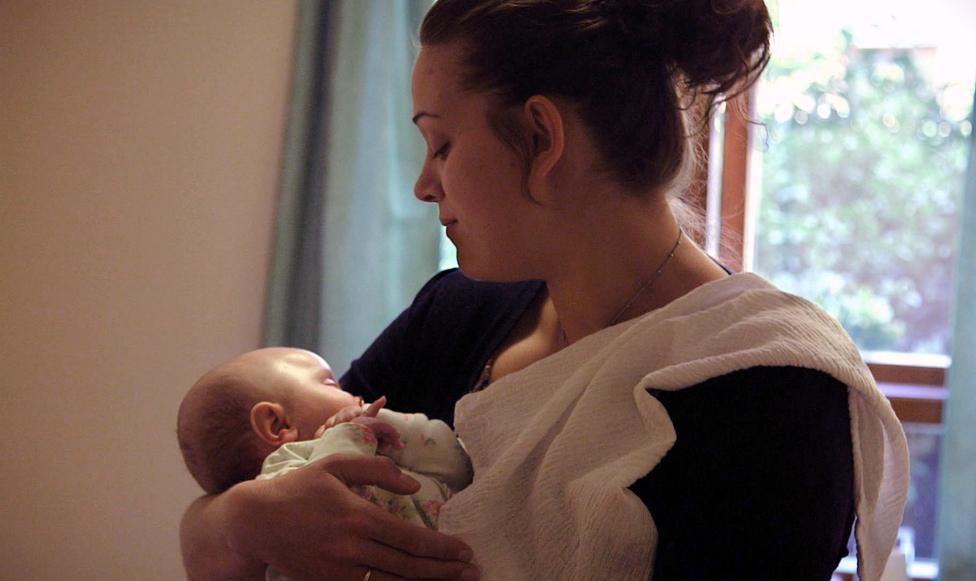
Hannah with her daughter Esther in a mother and baby unit
Imagine looking at your newborn baby and being convinced they are the son of God. You may think this recent plotline in EastEnders sounds far-fetched. But it's actually a common symptom of post-partum psychosis, a condition that affects one in 500 mothers.
"It's like being in a vivid nightmare only you don't wake up," says psychiatrist Dr Alain Gregoire, at the Winchester Mother and Baby Unit.
"You can go from being well to experiencing extreme thoughts and hallucinations very rapidly."
The condition affects thousands of women in the UK each year. The severe episode of mental illness, external starts in the days or weeks after giving birth and affects a mother's mood, thinking and behaviour. Symptoms include mania, depression, confusion, hallucinations and delusions.
Hannah, who gave birth to her daughter Esther in March 2015, says she didn't realise she was ill at first.
"I had this extra boost of energy and I just assumed my hormones were making things easy for me. I was staying up until 12 or 1," she says.
"Then Esther got sick and I started over-questioning and over-analysing everything."
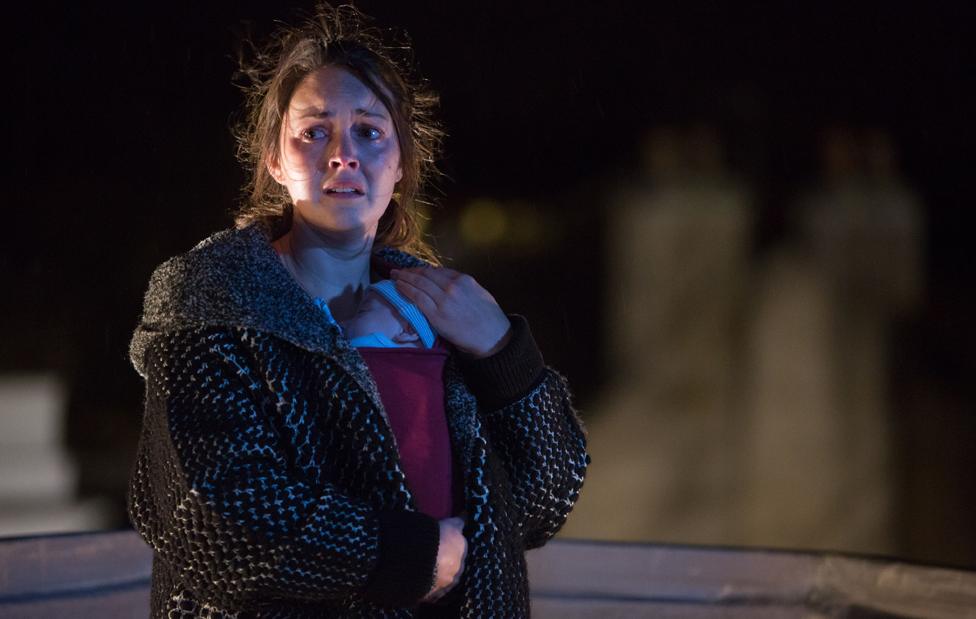
Character Stacey Branning suffers from post-partum psychosis in an Eastenders storyline
Hannah, who is a Christian, found she began getting odd thoughts that had a religious context.
"At first I thought God had told me I was pregnant with twin girls. I thought this was very reasonable. Apparently when I later went into the specialist unit, I did numerous pregnancy tests as I was so convinced."

Find out more
You can watch My Baby, Psychosis And Me on Tuesday 16 February at 22:45 on BBC One, or catch up afterwards on iPlayer.

Within weeks her delusions brought her to breaking point.
"I got it into my head that Esther would die the next day at midday but God would then bring her back to life. I told my husband Andy, who thought it was odd and didn't know what to make of it.
"When midday approached I ended up in a foetal position screaming and asking people to help me. I was screaming so loudly the neighbours came running."
Hannah was taken to her local GP by her mother and best friend. A local mental health crisis team was contacted and Hannah was admitted to a mother and baby unit. By this time her extreme moods had made her feel suicidal and over the coming weeks she made several attempts to kill herself.
"I felt so guilty but I couldn't stop it. I was very lucky not to die," she says.
Gregoire says many women don't receive help until their psychosis has progressed a long way. This is due to poor awareness of the condition and the stigma that still surrounds mental health.
"This condition is absolutely treatable and women shouldn't hesitate to seek help, but many hide their symptoms," he says.

What is post-partum psychosis?
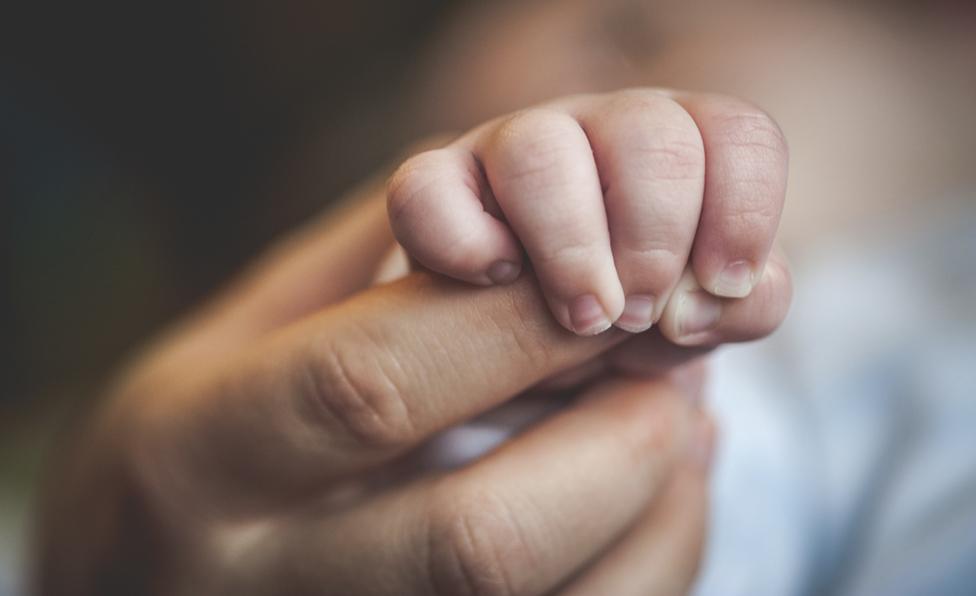
Postpartum Psychosis includes one or more of the following:
• Strange beliefs that could not be true (delusions)
• Hearing, seeing, feeling or smelling things that are not there (hallucinations)
• High mood with loss of touch with reality (mania)
• Severe confusion
Other common symptoms include having racing thoughts, behaving out of character and having trouble sleeping among others.
For more information advice and support visit the Action on Postpartum Psychosis, external website

"They are scared people will take their babies away from them. But most women, as long as they have access to a mother and baby unit, will stay with their babies the whole time.
"Ill mothers put their last ounce of energy into keeping their babies safe and evidence suggests mothers get better far quicker if they are kept with their babies."
The main treatment for post-partum psychosis is anti-psychotic medication.
"This is a critical treatment and should be given as quickly as possible," says Gregoire.
Hannah speaks about her experiences
"They are non-toxic and you can breastfeed on them. There is no doubt they work and I can guarantee to women in my care that they will get better with them."
Practical and psychological support is also given in the mother and baby units, providing vital relief for suffering mothers.
"I thought I was obviously a bad mum, so they filmed me with Esther to show me how I interacted with her," Hannah says.
"I also did simple tasks, which gave me a massive sense of achievement, such as washing Esther's clothes. The staff were amazing and really looked out for you. It took the pressure off. I sometimes needed to sleep until 3pm and it was safe in the knowledge Esther was being looked after."
Recovery from post-partum psychosis varies, with the average woman staying in a mother and baby unit for four to five weeks. When patients leave they continue to take medication and receive help and advice at home. However, in rare cases women may need to stay for up to six months.
Hannah had been allowed home for a few days after a month of treatment but continued to struggle with dark thoughts.
"I felt lower and lower and less in control," she says. "I was now on different medication to treat the depression but it needed time to work. It was really terrifying, I knew that if I didn't get help I wouldn't last much longer, so I agreed to have ECT sessions."
ECT or electroconvulsive therapy, external sends an electric current through the brain to trigger an epileptic fit and is used to relieve severe depression. It is administered under anaesthetic and usually has an immediate effect.
"I had 11 sessions in total and signed a consent form before each one," Hannah says. "By the fourth session I felt like I was coming back and after my ninth session I remembered thinking 'I could get through this.'"
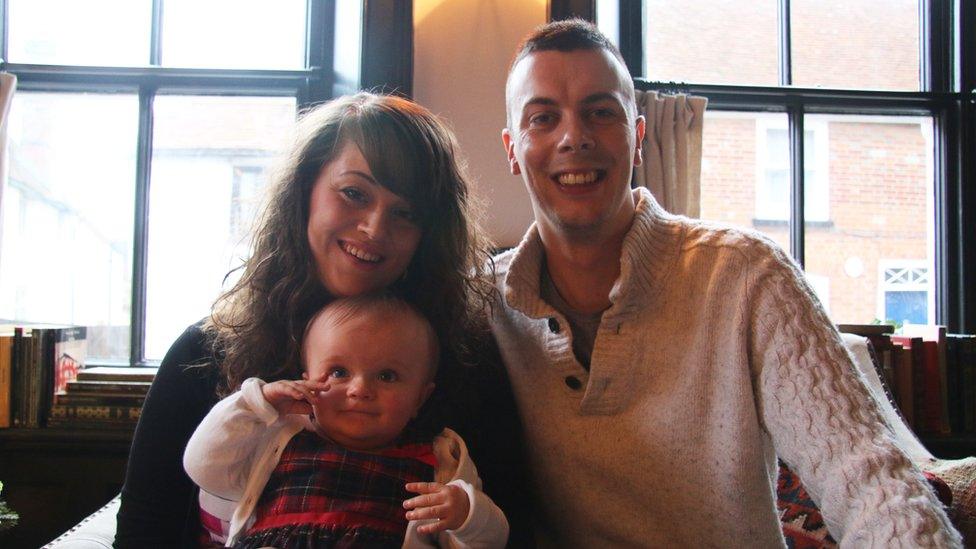
Hannah and Esther are now back at home
Hannah was discharged from the mother and baby unit last September and has slowly been coming to terms with her experience. She was diagnosed with bipolar disorder while at the unit and has since learned that this meant she had between a 25 and 50% chance, external of developing post-partum psychosis.
"I had wondered if I had bipolar in my early 20s," Hannah says.
"I would have very good days followed by a low that I couldn't control and I took anti-depressants for that. I wish I had known it would increase my risk but I hadn't even heard of post-partum psychosis and I'm a nurse."

What is bipolar disorder?
Bipolar disorder, formerly known as manic depression, is a condition that affects your moods, which can swing from one extreme to another.
If you have bipolar disorder, you will have periods or episodes of:
depression - where you feel very low and lethargic
mania - where you feel very high and overactive (less severe mania is known as hypomania)
Find out more: NHS Choices, external

Bipolar disorder is under-diagnosed, external in the UK, says Stephen Buckley, head of information at Mind.
"We know that it can take years for some people with bipolar disorder to get the right diagnosis, often because it involves change in mood over time," he says.
"In some cases people are misdiagnosed with other mental health problems such as depression which have symptoms in common. This can mean people are started on the wrong treatment path prolonging the process further."
Women also have a higher risk of post-partum psychosis if a close relative has had it but the condition can potentially affect any new mother. Changes in hormone levels and disrupted sleep are also thought to be involved, but research into the condition continues, external. Those at higher risk are advised to speak to their GP and local mental health team.
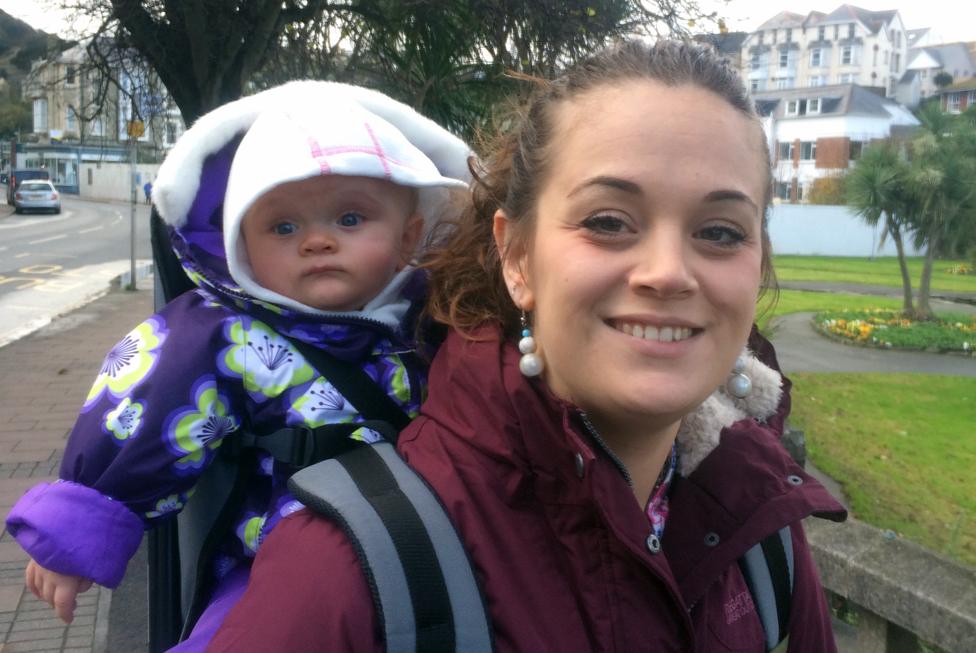
Hannah agreed to share her recovery process in a BBC documentary to help change attitudes towards mental illness.
"I would tell friends I had post-natal depression because I worried that if I told them I had been psychotic I wouldn't have any friends," she says.
"But they have been so understanding. It's important to break this stigma to help mums get help."
She has been impressed with the recent EastEnders plotline in which the character Stacey Branning struggles with post-partum psychosis, saying it was a realistic portrayal.
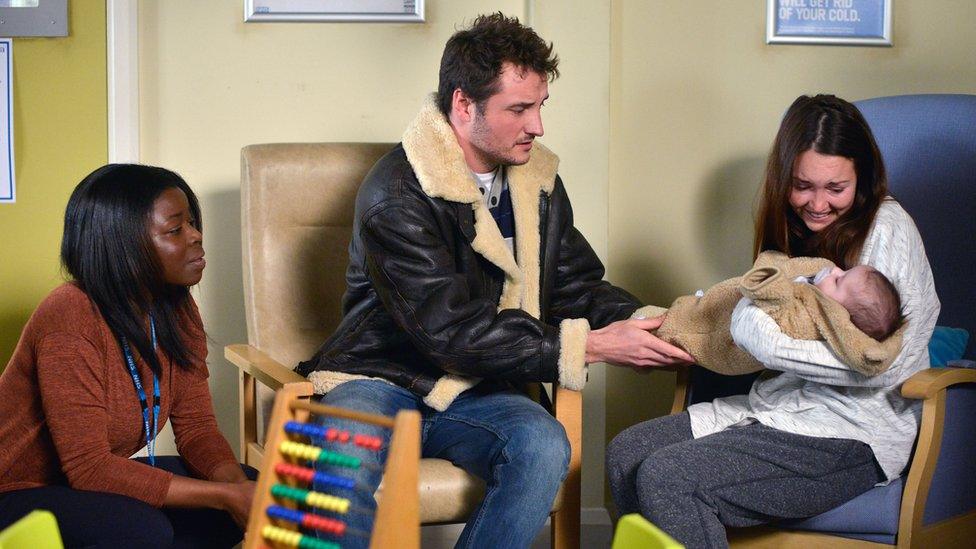
Character Stacey Branning (right) is reunited with her baby in a recent episode of EastEnders
In the soap Stacey is separated from her son because there isn't space for her in the nearest mother and baby unit. Gregoire, who is chairman of the Maternal Mental Health Alliance, external, says this is sometimes the unfortunate reality.
"There are 125 beds in specialist mother and baby units across the UK but we are lacking something like 60 beds, external," he says.
"This is an extremely serious condition, yet there are no units at all in Wales, Northern Ireland or South West England. If there was this lack of care in heart disease during pregnancy there would be an outcry.
"Women should demand expert services."

In The Mind - a series exploring mental health issues

Explained: What is mental health and where can I go for help?
Mood assessment: Could I be depressed?
In The Mind:, external BBC News special report (or follow "Mental health" tag in the BBC News app)

Subscribe to the BBC News Magazine's email newsletter to get articles sent to your inbox.